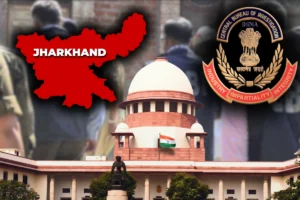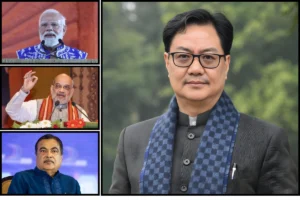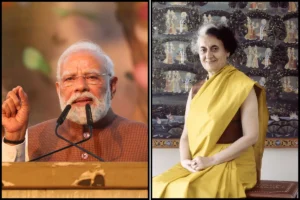
With November 10, 2024 marking the end of his 2 year tenure as CJI, DY Chandrachud said good bye to the office on Friday for 9 and 10 November being the weekend. Chandrachud will precede the now senior most judge of Supreme Court Sanjiv Khanna. Behind him CJI Chandrachud left a legacy of substantial judicial reforms and landmark verdicts.
From striking down the section 377 of Indian Penal Code, declaring right to privacy as basic right to pronoucing verdict on Ram-janmbhoomi and Babri Masjid land dispute, CJI has ruled many significant judgement of India’s judicial history, contributing to modernization of judiciary. However, his statements and judgements ignited controversies as well.
Son of former Chief Justice of India, YV Chandrachud, DY Chandrachud is a Harvard Graduate. Chandrachud has attained his education from Law centre of Delhi University and Harvard Law School. Holding key position like Chief Justice of Allahabad HC, Additional Solicitor General of India, and now retiring from the chair of Chief Justice of India, Chandrachud has served as prominent legal figure of the country.
Succeeding former CJI UU Lalit exactly 2 years ago in November 2022, DY Chandrachud has undoubtedly left an indelible mark on India’s judicial history.
Also Read: Delhi Pollution: Is Stubble Burning The Main Villain Or Just A Ploy To Divert Attention?
Historic Verdicts By CJI DY Chandrachud As He Retired Tomorrow
Chief Justice of India, DY Chandrachud have pronounced many key ruling during his tenure. De-criminalizing same-sex relation, declaring electoral bonds illegal, upholding centre’s decision of abrogation of Article 370 from Jammu and Kashmir remained highlights of CJI’s tenure.
Striking Down Section 377 Partially
The Supreme Court of India struck down Section 377 of the Indian Penal Code on September 6, 2018, decriminalizing consensual same-sex relationships. A five-judge panel decided that sexual orientation is an inherent component of human dignity, with Justice Chandrachud providing a concurring judgment.
Declaring Right To Privacy As Basic Right
On August 24, 2017, the Supreme Court of India unanimously ruled in a historic decision that the right to privacy is guaranteed by the Constitution as a basic right. Writing the majority ruling, Justice DY Chandrachud stressed the importance of privacy for people’s autonomy and sense of dignity in a democracy.
In concurring opinion, Justice Chandrachu said the section 377 “reduced a class of citizens to the margins”.
Ayodhya verdict
Justice Chandrachud is believed to have played a central role in the landmark 2019 Ayodhya verdict, though the 1,045-page ruling wasn’t attributed to any one judge.
The five-judge Supreme Court bench, led by former CJI Ranjan Gogoi, in November 2019, directed that a Ram temple be built on the contested site, and allotted a separate five-acre plot for a mosque.
Electoral Bonds case
‘Unconstitutional’ electoral bonds cannot miss when discussing CJI Chandrachud’s illustrous legacy.
The Supreme Court’s five-judge bench led by Chief Justice Chandrachud ruled that the Electoral Bond Scheme violates citizens’ Right to Information and Article 19(1)(a) of the Constitution, which upholds freedom of speech and expression.
The court observed that anonymous donations obstructed the voters’ access to key information impacting essential democratic transparency.
What Controversies Have Marred Justice Chandrachud’s Tenure
As CJI is Superannuating from the chair on November 10, his tenure has come under critical review of experts and critiques. Chandrachud’s tenure marked both historical verdicts and controversies.
Asking Deity To Solve Ayodhya Land Issue
Chandrachud’s recent admission that he pronounced Ayodhya verdict following him praying to God to find a solution to the issue has raised critical question as experts argue that decisions should be based on merits of the case and not on the Judge’s emotions and preferences.
Inviting PM(Executive) For Pooja At Home
CJI, inviting PM Modi for Ganesh pooja at residences invited backlash raising questions on independence of judiciary from executive. Chandrachud also faced severe backlash on the social media for the same.
Redesigning Lady Justice
Current Chief Justice of India DY Chandrachud is credited with commissioning a new emblem and flag for Supreme court of India. The transmission of lady justice from blind fold to a statue wearing ‘bindi’ sparked controversy and invited sharp criticism. While CJI argued that blindfold and sword identified as colonial legacies, critics argued that the change was an act of imitating government which has recently introduced three criminal law to replace old one. Along with critique of legal reforms, bar association of Supreme court also expressed dismay over changes introduced by CJI unilaterally.
To read more such news, download Bharat Express news apps



















